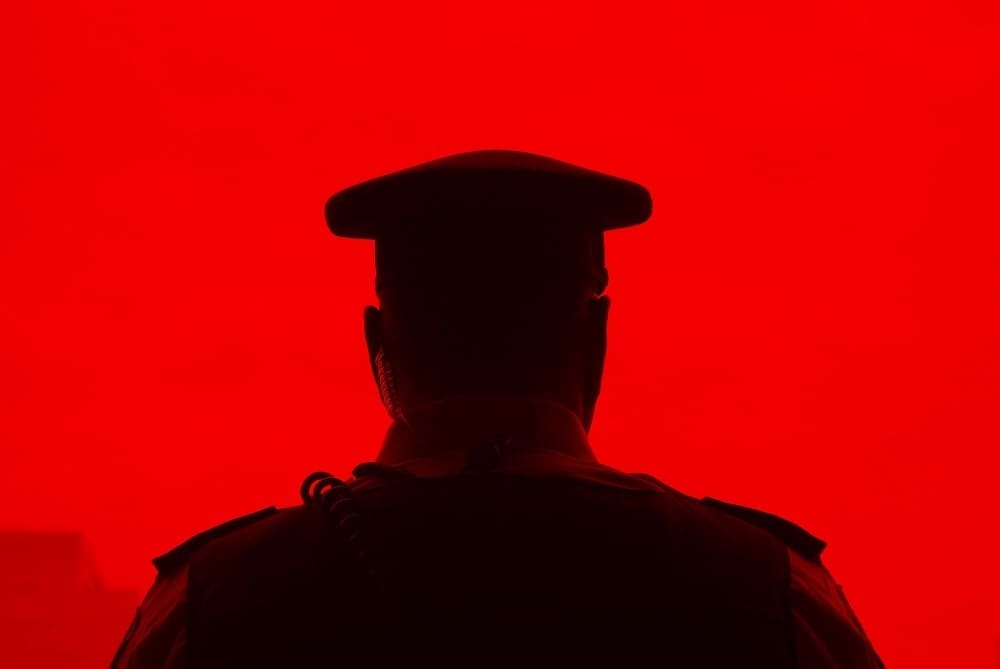The mistreatment and death of George Floyd has shone a bright light on abuse of power by the police. Sandy Erez comments on injustice and our nation’s collective awakening.
It is June 2020, and the violated Lady of Justice lies sprawled on the broken glass of American dreams, her unequally weighted scales too heavy for her to bear. After years of teetering precipitously, somebody has taken a giant knee to one of her scales, tipping her over the edge, her longstanding habit of skirting racial issues exposed for all to see.
The noise of her demise jolts us from a stupor of complacency. We’d been mute and motionless, like marionettes on a shelf. Now the shock brings us roaring to life, igniting us and propelling us to action.
We now wear the albatross of our nation’s crime, and it’s bringing us together. We are marching shoulder to shoulder, united in righteous rage, our individual lives on hold as we sacrifice self-interest for the common good…for a change.
The truth is, after years of fuming inside and piping out indignant social smoke, blowing the FloydGates of Justice wide open feels just great.
With the ugly truth out there in vivid black and white – and blue – there is a sense of relief. We no longer must prove abuse of power within the police force; their cover has been blown. Any chokehold now is on our indifference.
What took us so long?
“We live as we dream – alone. While the dream disappears, the life continues painfully.”
― Joseph Conrad, “Heart of Darkness”
For years, we have espoused racial quotas, human rights and inclusion. But even as we draped ourselves in Kente cloth in solidarity, we had not yet felt the weight of the yoke of inequality on our shoulders. Until now.
So, what was the catalyst?
For once, we didn’t hear the story and then move on to the next piece of bad news. We had a full 8 minutes and 46 seconds to become George Floyd, feeling the life being slowly snuffed out of us. We too cried for mama as we felt the searing image of the darker side of humanity reach the deepest corners of our pounding hearts. In a slow, 9-minute descent into hell, a door opened so that we might join him on the pavement, wondering with a last breath why this was happening in the land of the free and the home of the brave.
We got up from the pavement in Minneapolis. And we cannot sit down until justice is done; not because it could happen to us, but because it did.
Somewhere in the crosshairs between our innate self-interest and our compassion for others lies the only true motivation for change.
“Man is born free; and everywhere he is in chains”
― Jean-Jacques Rousseau, “The Social Contract,” 1761
The Age of Enlightenment was known as a period of great change in European societies, as feudalism and monarchies were exchanged for liberty and equality. Tiring of bayonetted heads adorning the capital cities of Europe, the great moral philosophers began to ask, how can individuals be free and still live together in a peaceful, safe society?
The likes of Thomas Hobbes, John Locke and Jean-Jacques Rousseau posit that man is motivated by inborn self-interest. The only solution is banding together and committing to a moral pact that offers protection from the primitive urge to kill one another when our self-interests are threatened.
Once members collectively sacrifice individual freedoms to the body politic, the governing body takes responsibility to enforce the social contract while simultaneously ensuring liberty for all.
Known as the social contract theory, it heavily influenced the founding fathers and is considered the basis of the United States Constitution.
“The principles of justice are chosen behind a veil of ignorance.”
― John Rawls, “A Theory of Justice,” 1971
If all good theories go to hell in practice, this one is no different. Modern philosophers John Rawls and John Stuart Mill identified the flaw: “Civilized” European white men during the Enlightenment considered non-whites not fully human. Not party to the contract, they could be denied contract privileges. Oh.
This state of mind enabled enslaving, colonizing and plundering other nation races without the inconvenience of breaching the social contract. It’s also how Thomas Jefferson could own 600 slaves in his lifetime and keep a straight face while spouting about all creatures being endowed with unalienable rights.
That’s considered cognitive dissonance today, but it was business as usual for the “moral thinkers” of the time. In the terms of the social contract theory, people in power have the right to abuse “sub-people” if doing so supports their self-interests. It was that simple. And that ugly.
That destructive sentiment was sewn so tightly into the fabric of our nation’s social contract that today’s victims of racism wear the torn and tattered cloth as their shroud.
“I’ve got no strings to hold me down, to make fret or make me frown…”
― Disney song from “Pinocchio,” 1940
We all remember Pinocchio, the mischievous wooden puppet who could only transition into a real boy once he learned to make the right moral choices. He, too, was part of a social contract formed with Geppetto, the wood-carver, and Jiminy Cricket, his friend and conscience.
While on a path to pursue their dreams, Pinocchio and his friends were shocked to discover their individual actions had consequences – not only for themselves, but for all parties in our interconnected, societal body.
They also learned that living without ties to any legislative framework can be less than optimal for survival. Unsavory characters sensed Pinocchio’s vulnerability and took advantage of his no-strings-attached, unpoliced state to manipulate him to serve their own interests. Not unlike the looters in our major cities.
Now, as fires of justice begin to burn around the globe, we recognize that motivating real social change requires tools that promote empathetic identification with victims’ pain and suffering. Diversity/human rights training that only goes skin deep just won’t do it – and even more so for those at the top who wield power.
Until we succeed in pulling the heartstrings of the guardians of our social contract toward their innate, innermost humanity, we are puppets in their hands.
It’s time for all of us to get real.













